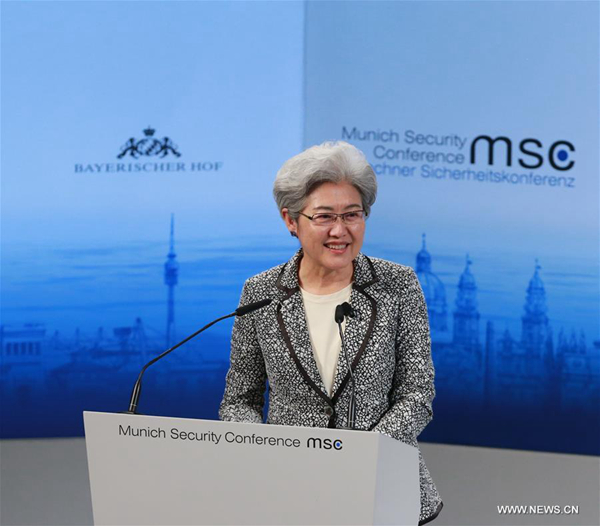The post-West world order
china.org.cn / chinagate.cn by Sajjad Malik, February 28, 2017 Adjust font size:
|
|
|
Fu Ying, chairwoman of the Foreign Affairs Committee of the National People's Congress of China, addresses the Munich Security Conference (MSC) in Munich, Germany, on Feb. 13, 2016. (Xinhua/Luo Huanhuan) |
The international political system is in a state of flux. Doubts have been expressed about the efficacy and viability of some of the key institutions which are the mainstay of the political and security order put in place after the end of World War II to regulate world affairs.
For some time experts have been pointing out in explicit or implicit terminology that the emergence of new global players, the rise of China and the resurgence of Russia, has brought the world to a point where vital adjustments are required to keep the system moving ahead without any major mishaps.
The election of Donald Trump provided new force to the whispers about the incoming change on the horizon of global politics. His disdain for shouldering the burden of key allies in Europe, Asia Pacific and elsewhere has created an environment for powers like Russia to openly question the dominance of the West.
The strongest call for revision of the existing order has been issued by Russian Foreign Minister Sergei Lavrov. Addressing the 53rd Munich Security Conference, Mr. Lavrov advocated the need for a new "Post-West World Order." Lambasting NATO as a relic of the Cold War era, he said that responsible world leaders would help to create a new world order.
He has not explained the details of the new world order. But the way Mr. Lavrov phrased - Post-West World Order - it is obvious that it should be free of the dominance of the U.S. and Western Europe.
The current system pegged on the trans-Atlantic security arrangement was designed to counter the now defunct USSR. NATO was the main plank in the system, which under Article 5 of the alliance provided collective security for its members.
Ideally, the system should have been overhauled right after the demise of the former USSR. But since it helped to maintain U.S. supremacy while assuring security of its smaller members under the surrogacy of Washington, it was kept in place despite its failings and inadequacies. But now due to the reluctance of the U.S. to continue to play its former role, it has become clear enough that the old order is unable to cater for its needs or to manage the conflicts of the 21st century.
For example, it has failed to address the threat posed by extremism and militancy. The solution applied in the wake of 9/11 badly backfired and instead of containing the problem, it has increased manifold. That is why the world is more threatened due to militancy today than a decade ago.
The existing security mechanism has also failed to address the horrendous civil war in Syria and the raging conflict in Ukraine. NATO had no answer except issuing ineffective condemnations when Russia moved its forces to annex Crimea.
Mr. Lavrov is not the first to demand changes in the current dispensation. In fact, Mr. Trump was the first to openly question the existence of NATO and the vast resources spent by America to keep its allies safe. Though, Vice President Mike Pence tried to reassure European allies in Munich that the U.S. was standing by them. But it came with tag: "The time has come to do more," Mr. Pence told his allies.
It is obvious that the U.S. would not be doing everything for free, as it did in the past. The demand is not to just pay the dues in time but to also pay more. Actually, the message is that the European countries should pay for their defense.
Mr. Trump's idea of NATO resonates with Mr. Lavrov's. The latter said in Munich that the trans-Atlantic alliance was still stuck in the Cold War mode of thinking. It shows that America may be ready to reform the existing order to reduce its own military expenses and foreign commitments.
The changes will not come overnight. But I think that the post-Cold War transition marked by U.S. dominance might be nearing its end. The system is highly lopsided and it is important that adjustments should be made. New power centers should be given their due role in stabilizing the world.
Apart from Russia which is demanding equality with the West in the Post-West order, it would be vital to give China its due share vis-à-vis its economic and military power. China may not settle for a secondary role in the new world because it is not like Japan which, despite being the second biggest economy for a long period, virtually had no role in the global security apparatus.
Sajjad Malik is a columnist with China.org.cn. For more information please visit:
http://www.china.org.cn/opinion/SajjadMalik.htm
Opinion articles reflect the views of their authors, not necessarily those of China.org.cn.
